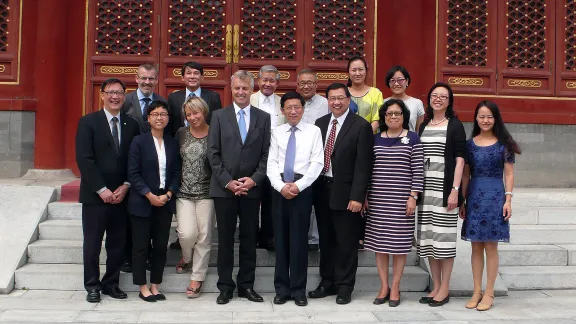
LWF delegation in China, July 2013. © LWF/Philip Lok
Coping with Church Growth in World’s Most Populated Country
(LWI) – “I am impressed by the dynamic developments that are taking place in the church in China,” said The Lutheran World Federation (LWF) General Secretary Rev. Martin Junge following an official visit to the Republic of China 22–27 July. “At the same time, the growth of the church raises important challenges as to its sustainability regarding leadership and infrastructure,” Junge reflected.
“Christianity is the fastest growing religion in China. It is a good but challenging sign,” said Mr Jiang Jianyong, vice-minister of the Chinese State Administration of Religious Affairs (SARA), “because the church is unable to cope with the growth in terms of raising or training enough pastors to look after the flock.” Along with the Chinese Christian Council, SARA is encouraging the LWF to provide support to the Chinese Church to cope with the challenges of growth.
The LWF delegation visited the Protestant Church in China, the Three-Self Patriotic Movemement (TSPM); the Chinese Christian Council; as well as government representatives. The aim of the visit was to engage in dialogue on how the LWF can accompany the fast-growing Chinese church. The delegation met with both government officials and church leaders including Rev. Gao Feng, President of the Chinese Christian Council and Elder Fu Xianwei, Chairman of TSPM.
Junge said that throughout the visit he had heard a repeated reference to three major tasks with which the TSPM is confronted: “to equip lay and ordained leaders, to strengthen the diaconal profile and diaconal capacities of the congregations, and to contribute to harmonious inter-faith relationships in local neighborhoods and in the Chinese society at large. Altogether, these tasks point at the eagerness of the church to claim its citizenship in the context of China in new ways,” emphasized Junge.
240 pastors serving 2 million members
TSPM is experiencing explosive growth in a country with 1.3 billion citizens, a majority of which is atheist. In Jangsu province alone, one of the areas visited by the LWF delegation, there are an estimated 2 million Christians. “And this is not unique,” said LWF Area Secretary for Asia Dr William Chang. “The church in Jangsu is growing with thousands of people a year but to serve all the congregations [in Jangsu] there are only 240 pastors,” he said.
The Chinese Christian Council is in charge of pastoral training, church order and publication of Bibles and hymnals. In addition, it manages the diaconal organization The Amity Foundation, the largest charity in China, which, in their own words is “serving as a bridge for the Christian Church and society.”
LWF member churches in the Asia and North America region and mission partners in the Nordic countries already have bilateral connections with some churches of TSPM and provincial Christian Councils through which they support diakonia and training.
The subject of diaconia as a theological discipline is largely untouched in the theological curricula taught at protestant seminaries, said Dr Joergen Skov Soerensen, General Secretary of the Council on International Relations of the Evangelical Lutheran Church in Denmark and member of the LWF delegation. “My impression is, that the China Christian Council is convinced of the potential merits of a theological curriculum including diaconia and the fact that this would eventually benefit the Protestant Church in China vis a vis society.”
Re-connecting to LWF’s history with the church in China
“Throughout the visit, we were able to witness the wondrous groundwork which has been done by a few Lutheran member churches in Asia and mission partners,” reflected Eun-hae Kwon, LWF vice-president for the Asia region and member of the delegation.
“Therefore, Lutheran churches were recognized and remembered as a good old friend among the church leaders in China, which contributed to strengthening and deepening the relationship between [the] LWF and the churches in China.” There were high expectations and visions for the next phase of mutual accompaniment in God’s mission, Kwon said.
Junge said that his visit to China was a way to reconnect to a longstanding history of the LWF with the church in China. He referred to the LWF China Studies Series, a collection of publications ending in 2003 which raised awareness among LWF member churches about the history, development and present realities of Chinese churches.
“My visit was also an opportunity to connect to the many ways in which Lutheran seminaries, churches and specialized ministries are currently supporting the Church in China. There is great appreciation among the local leadership for these meaningful ways to accompany and support their witness,” said Junge.
The LWF delegation was welcomed warmly throughout their visit and left with an impression of a church that is developing in a dynamic way.
“The LWF has accomplished a solid first step toward a relationship of accompaniment, mutual respect and global perspectives with the many dimensions of Chinese Christian community,” reflected Dr Peter Shen, a North American delegate.
Junge said the LWF will now look into how to follow up the visit to China in a concrete way. “I return to the Communion Office with the commitment to explore ways to respond to the many requests inviting us to continue supporting the churches in their processes of consolidation and growth,” he concluded.


